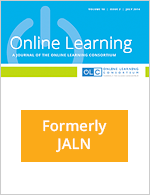Blended Course Design: A Synthesis of Best Practices
Blended or hybrid course offerings in higher education are commonplace and much has been written about how to design a blended course effectively. This study examines publically available guides, documents, and books that espouse best or effective practices in blended course design to determine commonalities among such practices. A qualitative meta-analysis reveals common principles regarding the design process, pedagogical strategies, classroom and online technology utilization, assessment strategies, and course implementation and student readiness. Findings reveal areas of disconnect and conflict, as well as implications for the likelihood of successful utilization when best/effective practices are followed.

